Baidu Q2 Earnings: Speeded-Up AI Cloud Boosts Revenue Positive Growth
Baidu's second-quarter financial report showed that total revenue of 33.9 billion yuan was roughly flat year-on-year. The AI Cloud business offset the weakness in online marketing revenue, bringing a small positive growth to Baidu's core revenue.
On August 22, Baidu released its second quarter performance report ending June 30 this year.
The financial report shows that Baidu's total revenue in the second quarter was 33.9 billion yuan (RMB, the same below), an increase of 8% month-on-month and roughly the same as the same period last year; net profit attributable to shareholders was 5.5 billion yuan, a year-on-year increase of 5%; operating profit under non-GAAP was 7.5 billion yuan, a year-on-year increase of 2%; diluted earnings per American depositary share was 15.01 yuan; adjusted EBITDA was 9.1 billion yuan, and the adjusted EBITDA margin was 27%.
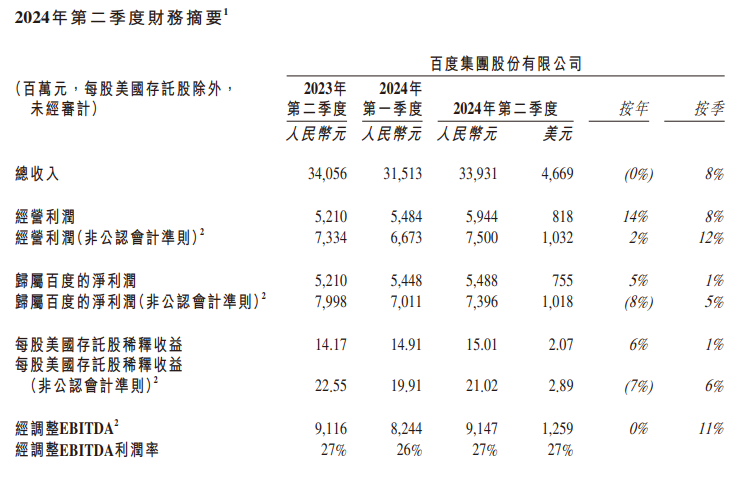
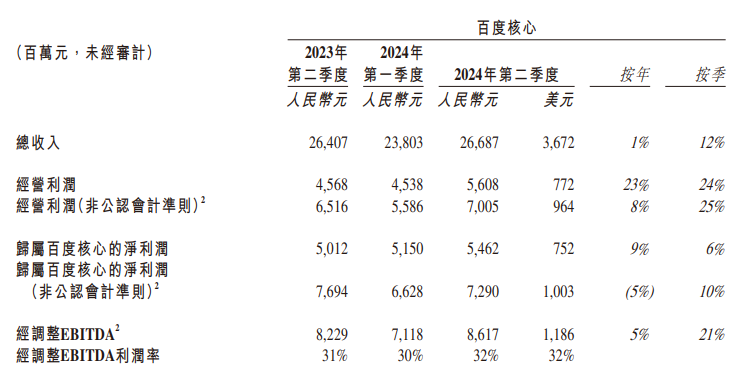
As for the "Baidu Core" business, the total revenue in the second quarter was 26.7 billion yuan, a year-on-year increase of 1%; the core operating profit was 5.6 billion yuan, a year-on-year increase of 23%. Among them, online marketing revenue was 19.2 billion yuan, a year-on-year decrease of 2%, and non-online marketing revenue was 7.5 billion yuan, a year-on-year increase of 10%; iQiyi's revenue was 7.4 billion yuan, a year-on-year decrease of 5%, which was lower than market expectations.
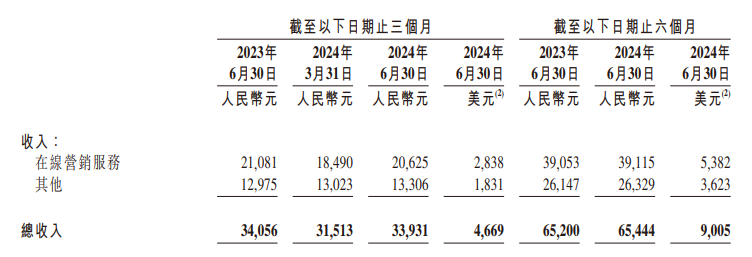
GenAI Searching Results Account for 18%
Currently, Baidu's advertising business is facing considerable external pressure, and the marketing efforts of industries such as real estate and automobiles have been greatly weakened. In addition, netizens are spending more and more time on social media platforms such as Douyin and Kuaishou, and many factors have led to losses in online advertising business this quarter.
As China's largest Internet search platform, Baidu's revenue is still mainly based on online marketing. In the search business, Baidu has created major revenue and profits for the quarter based on the marketing function of this function, and has supported the innovation and development of various businesses.
At the internal application level, search has become an important entrance to Baidu's AI application "intelligent agent" due to its large-scale traffic benefits. Currently, 18% of Baidu's search results (text, images, links, etc.) are generated by AI, which has brought positive feedback to advertising marketing.
At the conference call, Baidu founder, chairman and CEO Robin Li also emphasized that the competition in the large model will be more intense in the next two to three years, and revealed that the ERNIE large model will continue to be used to improve the search function in the third quarter, but the monetization ability is weak and the profit will be under pressure in the short term. ”
From the perspective of mobile ecology, in June 2024, the monthly active users of Baidu APP exceeded 700 million, reaching 703 million, a year-on-year increase of 4%, and the quarterly online marketing revenue was 19.2 billion yuan. The hosting page revenue accounted for 51% of Baidu's core business online marketing revenue in the second quarter of 2024.
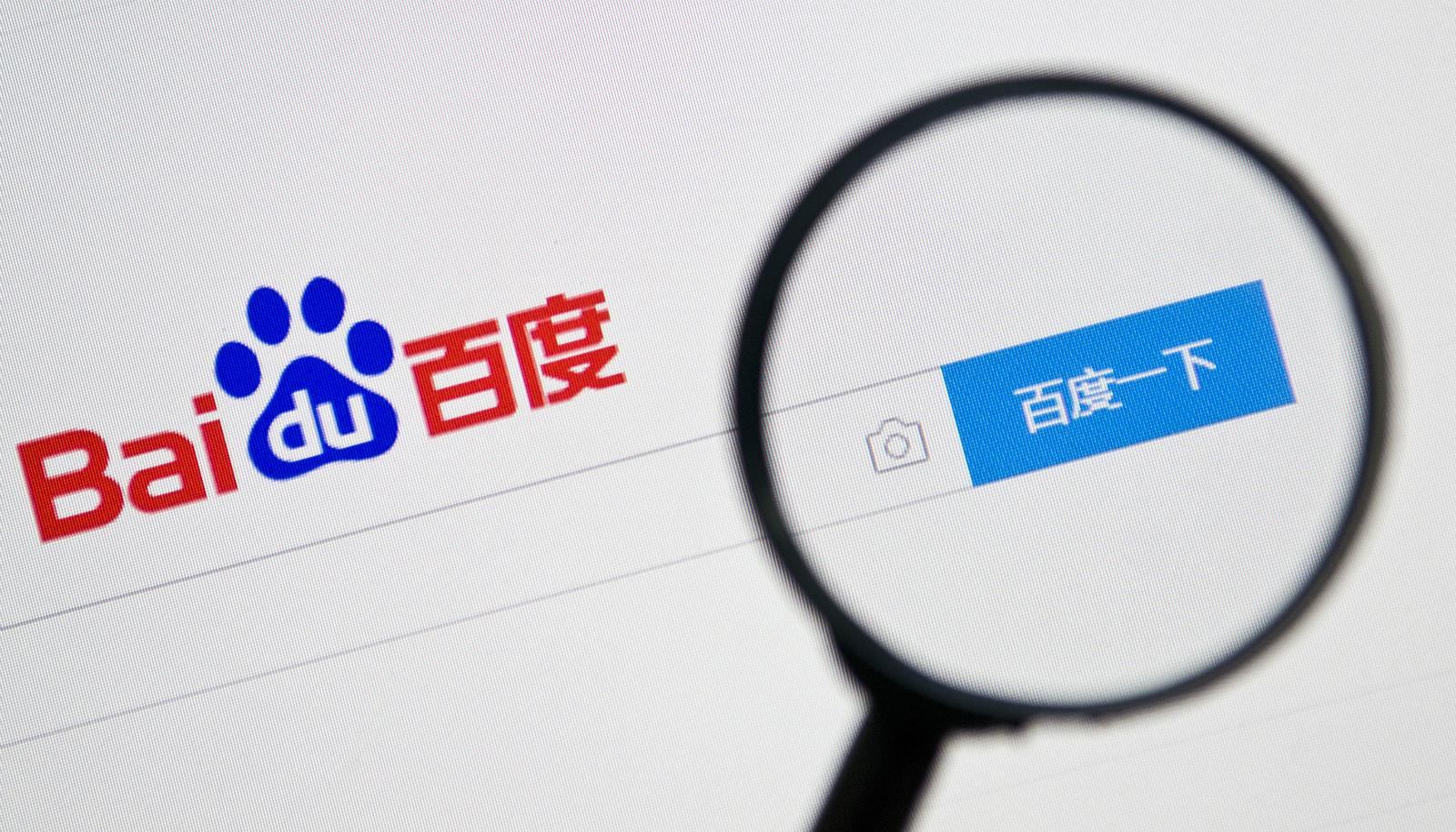
AI Cloud Further Increased to 9%
Fortunately, the continued acceleration of the AI Cloud business in the second quarter offset the macro resistance that online marketing revenue continued to face, and brought a small positive growth to Baidu Core's revenue.
It is reported that Baidu AI Cloud recorded revenue of 5.1 billion yuan in the quarter, a year-on-year increase of 14% and achieved sustained profitability. At the same time, the proportion of revenue contributed by AI further increased to 9%, higher than 6.9% in the previous quarter, which also reflects the optimization of Baidu's business structure and the effectiveness of strategic adjustments.
So far this year, Baidu has continued to increase its investment in its AI Cloud business and has launched a number of new products and new initiatives:
- In April, the intelligent agent platform AgentBuilder was launched, and since then, the ERNIE 4.0 was also opened on the platform for free, which further benefits developers.
- In May, the ERNIE-Speed, ERNIE-Lite, and ERNIE-Tiny series model pre-set services were open to customers for free.
- In June, ERNIE 4.0 Turbo was launched to expand the richness of the series of models. Compared with the 4.0 version, Turbo runs faster and costs less.
- In July, the two flagship models ERNIE 4.0 and ERNIE 3.5 were significantly reduced in price, further reducing the cost of large models and trial and error costs for enterprises.
Public data shows that the average daily call volume of ERNIE large models has exceeded 600 million times, processing about 1 trillion tokens of text per day, while the average daily call volume in the fourth quarter of 2023 was only 50 million times, an increase of more than 10 times in half a year. As of June, the number of Baidu PaddlePaddle and ERNIE ecosystem developers has reached 14.65 million. As of July, Qianfan large model platform has cumulatively served 150,000 corporate users, helped users fine-tune 21,000 large models, and helped users develop 550,000 AI native applications.
In the post-performance conference call, Robin Li said: "The transformative role of AIGC and basic models in business and daily life is becoming more and more obvious. Thanks to the advantages of full-stack AI technology and the rapid popularization of AI applications built on ERNIE large models, we are expanding the scale of AI implementation."
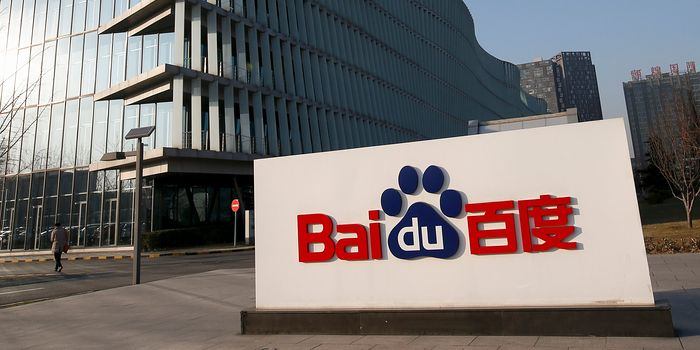
Apollo Orders Increased 26% YoY
On June 19, Baidu's autonomous taxi service Apollo began to provide taxi-hailing services throughout Wuhan City. During the period, it provided about 899,000 autonomous driving services to the public, a year-on-year increase of 26%. As of July 28, the total number of autonomous driving travel service orders provided nationwide exceeded 7 million.
In May this year, Baidu released an unmanned vehicle equipped with the sixth-generation autonomous driving system solution of Apollo, and launched the world's first large-scale Apollo ADFM that supports L4 autonomous driving. At present, the sixth-generation car RT6 has begun large-scale fully unmanned road testing.
According to Robin Li, the cost of each vehicle fell by 50% in the quarter, and the Wuhan area will soon break even, and it is expected that the cost will be further reduced after RT6 is officially put into operation. However, Apollo has a "very small" share in the entire taxi-hailing market, and it will take time to expand the market.
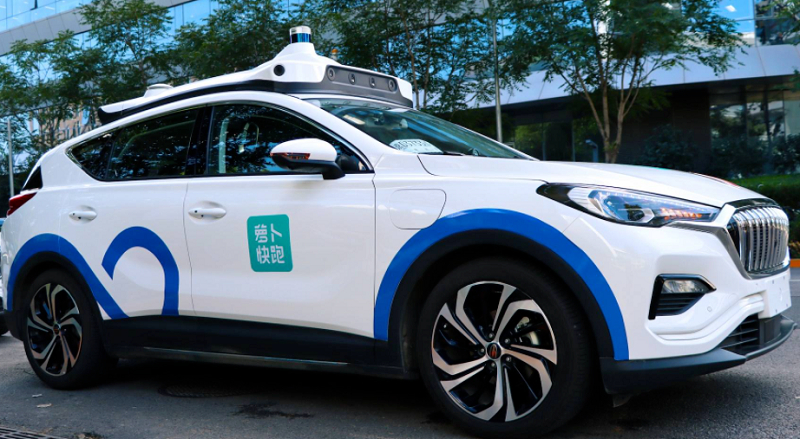
·Original
Disclaimer: The views in this article are from the original Creator and do not represent the views or position of Hawk Insight. The content of the article is for reference, communication and learning only, and does not constitute investment advice. If it involves copyright issues, please contact us for deletion.